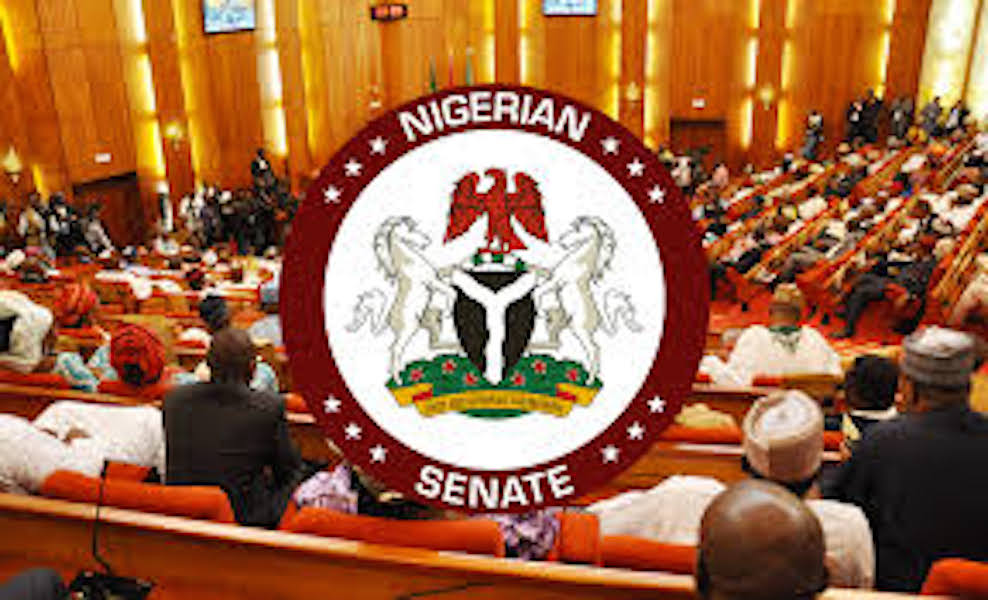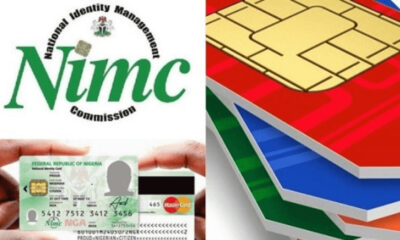News
Again, FG Shifts Deadline for NIN Verification to July 26

Following the slow verification of the National Identification Number (NIN) by the Identity Management Commission (NIMC) the federal government yesterday extended the deadline for NIN-SIM data verification from June 30 to July 26.
Yesterday’s extension of the deadline made it the seventh time the federal government would be postponing the deadline, since the beginning of the exercise.
The federal government has equally increased facilities for the registration of NIN to 5,410 nationwide.
In a joint statement yesterday by the Nigerian Communications Commission (NCC) and the National Identity Management Commission (NIMC), and signed by the Director of Public Affairs at NCC, Dr. Ikechukwu Adinde, and the Head, Corporate Communications at NIMC, Mr. Kayode Adegoke, stated that the decision to extend the deadline was made after a request by stakeholders on the need to consolidate the enrolment and NIN-SIM verification process following the rapid increase in the number of enrolment systems nationwide.
The federal government, in December 2020, had directed telecoms subscribers to register their NIN and submit same to network operators for verification and linkage with their SIM cards.
However, the Joint Implementation Committee (JIC) on harmonisation of National Identification Number (NIN) with Subscriber Identification Module (SIM), otherwise known as NIN-SIM Harmonisation Committee, has rated NIN-SIM verification and integration exercise very low for May .
The committee’s latest report on NIN submission and verification, covering March to May, showed that subscribers have continued to submit their NINs to mobile network operators (MNOs) for verification and linkage to their telephone lines, as directed by the federal government.
The information gathered, however, showed that the verification and linkage has been abysmally slow, due to the alleged poor funding of NIMC, the government agency, responsible for NIN enrolment and verification.
According to the committee’s report, active telephone lines as of May were 192 million, and a cumulative 95.6 million NIN owners submitted their NIN in the same month. But only 1.3 million NINs were verified and linked during the review period.
A breakdown of the statistics showed that in March, active telephone lines were 196 million, but the number dropped to 192.4 million in April and further dropped to 192.1 million in May 2021. The number of subscribers that submitted their NINs through the networks of MNOs was 90.35 million in March, representing 46 per cent of the total number of subscribers.
The figure increased to 90.38 million in April, representing 47 per cent and further increased to 95.6 million in May, representing 49.7 per cent.
From the total number of NIN submitted, only 588,010, were verified and linked in March 2021, representing 0.6 per cent, only 929,846 were verified and linked in April, representing one per cent, while only 1.3 million NINs were verified and linked in May, representing 1.4 per cent of the total number of submitted NINs.
Total NIN enrolment by MNOs in March was 210,487 with 123,379 generated NINs.
In April, it rose to 413,272 NIN enrolments with 234,499 generated NINs. In May, the figure rose again to 530,893 NIN enrolments with 335,193 generated NINs.
But from March to May, the total NIN enrolments by all NIMC partners, were two million in March, three million in April, and two million in May.
The total NIN penetration, which is the number of NINs successfully linked, was put at 51 million in March, representing 24.1 per cent of Nigeria’s population of 211.4 million, 54 million in April, representing 25.5 per cent of the population, and 56 million in May, representing 27 per cent of the population.
When asked to comment on the low verification figure, both NIMC and NCC declined to comment, but a source close to NIMC said: “The figures are correct but NIMC cannot comment because NIMC is not involved in NIN-SIM linkage, even though NIMC verifies all registered NINs from its back end server.”
NIMC is of the view that the issue of incomplete and inappropriate SIM registration on the network of MNOs, could be responsible for slow NIN-SIM integration, but the Joint Implementation Committee thinks otherwise, blaming the situation of slow verification on poor funding of NIMC, resulting in the inability of NIMC to implement the recommended Bulk NIN Verification process that would speed up NIN verification and integration.
The committee said NIN verification and linkage by MNOs remained meagre at 0.6-1.4 per cent from March through May 2021, in comparison to 46-49.7 per cent of the national telecommunications base that submitted NINs over the period.
It stated that the trend will continue as long as bulk NIN Verification by NIMC is not in place.
The committee’s report said: “It is pertinent to mention that Bulk NIN Verification is still at the Proof-of-Concept (POC) stage since January 2021. NIMC needs to confirm a timeline when Bulk NIN Verification will commence. Without this, MNOs will continue to collect submitted NINs from customers but will not be able to verify and link them to customer’s telephone lines, as required, to achieve the stated objectives of the government. Without Bulk NIN Verification, MNOs would have to resort to overnight Batch NIN Verification processing using the Single NIN Verification API or otherwise invite their customers to visit MNO outlets for Individual NIN verification using the same API. NIMC’s systems would become overwhelmed by the millions of requests for overnight Batch NIN Verification processing from all MNOs leading to poor performance outright failure of the processing systems.”
The committee called on NIMC to take urgent action to rollout Bulk NIN Verification, without which verification of the 95.6m submitted telephone lines, which would continue to grow monthly, cannot happen and government’s directive to verify and link NINs to customer SIMs will not be achieved.
The Minister of Communications and Digital Economy, Dr. Isa Ibrahim Pantami, had in December 2020, issued a directive through NCC, for all telecoms subscribers to register their NIN and submit same for to their network operators for verification and linkage.
The initial directive had two weeks window to complete the NIN registration and verification, with a threat to deactivate the SIM of any subscriber who failed to comply within the stipulated period.
The deadline was later extended and since then, government has continued to extend it.
News
Senate Explains Why Real-Time E-Transmission Cannot Be Mandatory in 2027 Elections

Senate Explains Why Real-Time E-Transmission Cannot Be Mandatory in 2027 Elections
The Nigerian Senate has defended its decision to make electronic transmission of election results discretionary rather than mandatory in the ongoing amendment to the Electoral Bill 2026, insisting the move is grounded in data, infrastructure realities and legislative responsibility — not political sentiment.
The controversy centres on Clause 60(3) of the proposed amendment, which originally stated that a presiding officer “shall electronically transmit the results from each polling unit to the INEC Result Viewing Portal (IReV) in real time.”
After debate, lawmakers retained electronic transmission but removed the mandatory “real time” requirement, introducing a caveat that where internet connectivity fails, Form EC8A — the official manual result sheet — will serve as the primary basis for collation.
Senate: Decision Based on Empirical Data
Leader of the Senate, Opeyemi Bamidele, clarified the chamber’s position in a statement issued through his Directorate of Media and Public Affairs, stressing that lawmaking “comes with huge obligations globally” and cannot be driven by emotion.
According to Bamidele, the Senate consulted stakeholders in the telecommunications and energy sectors before revising the clause. He said the decision reflects the “stark realities” of Nigeria’s communications and power infrastructure.
READ ALSO:
- Osun PDP Lawmakers Endorse Tinubu for 2027, Back Adeleke Re-Election
- MACBAN Rejects Terrorism Allegations, Warns Against Stigmatisation
- Customs Seize Cocaine Worth N1bn Along Nigeria–Benin Corridor
Key Data Cited by the Senate
- Nigeria recorded about 70% broadband coverage in 2025, but actual internet penetration stood at roughly 44.53% of the population, according to figures from the Nigerian Communications Commission.
- The Speedtest Global Index ranked Nigeria 85th out of 105 countries in mobile network reliability and 129th out of 150 countries in fixed broadband reliability.
- In the power sector, approximately 85 million Nigerians lack access to grid electricity, representing about 43% of the population.
- Although generation capacity fluctuates between 12,000 and 13,500 megawatts, only around 4,500 megawatts are typically delivered nationwide.
Bamidele argued that making real-time electronic transmission mandatory under such conditions could create operational bottlenecks, trigger disputes and potentially destabilise the electoral process, particularly in rural communities with weak connectivity.
“By global standards, real-time electronic transmission of election results may not be practicable at this stage of our development,” he said.
What the Amendment Means
The revised clause does not abolish electronic transmission of results. Instead, it provides flexibility in implementation.
The Senate maintains that Section 62(2) of the Electoral Act 2022 already establishes a National Electronic Register of Election Results, and the amendment aims to reinforce the framework without creating a rigid mandate that may prove impractical nationwide.
Under the current system operated by the Independent National Electoral Commission (INEC):
- Results are entered into Form EC8A at the polling unit.
- The presiding officer uses the BVAS device to upload a scanned copy to the IReV portal.
- The portal allows public viewing of polling unit results for transparency.
READ ALSO:
- Security Row: El-Rufai Accuses Ribadu of Procuring Dangerous Chemicals
- Singer Market Fire: Tinubu Sends Shettima, FG Delegation to Kano
- Omokri Alleges Possible Hacking in Obi–Oyedepo Audio Leak, Mentions el-Rufai
The Senate’s revision would allow uploads to remain in place, but without invalidating results in areas where connectivity prevents immediate transmission.
Opposition and Public Backlash
The decision has sparked significant debate across Nigeria’s political landscape.
Former presidential candidate Peter Obi and former Rivers State governor Rotimi Amaechi have criticised the move, arguing that weakening mandatory real-time uploads could undermine electoral transparency and public trust ahead of the 2027 general elections.
Civil society groups and election observers warn that introducing a “network failure” clause may create loopholes that could be exploited during collation, particularly at ward and local government levels.
However, supporters of the Senate’s position argue that insisting on a strict real-time requirement without adequate infrastructure could lead to widespread technical failures, contested results and post-election instability.
House–Senate Differences and Next Steps
The House of Representatives is understood to favour retaining the mandatory real-time transmission language, setting the stage for a conference committee to harmonise both versions of the bill.
The final wording of Clause 60(3) will likely shape Nigeria’s electoral governance framework heading into 2027 and determine whether real-time electronic transmission becomes a statutory obligation or remains subject to operational discretion.
As debates intensify, the issue has become a defining test of Nigeria’s commitment to electoral reform — balancing technological ambition with infrastructural reality.
Senate Explains Why Real-Time E-Transmission Cannot Be Mandatory in 2027 Elections
News
Osogbo Sons and Daughters Mark 5th Anniversary with Awards, Political Undertones

Osogbo Sons and Daughters Mark 5th Anniversary with Awards, Political Undertones
The 5th anniversary celebration of Osogbo Sons and Daughters drew prominent indigenes, political office holders, traditional leaders and stakeholders to a colourful gathering focused on the development of Osogbo, the Osun State capital.
Members of the Osogbo United Youth Forum were also in attendance at the event, which featured the presentation of meritorious awards to distinguished sons and daughters of the town in recognition of their contributions to community growth.
Among the award recipients were the member representing Osogbo Federal Constituency in the House of Representatives, Alhaji Moruf Adewale Gangari; the Secretary to the Osun State Government, Alhaji Teslim Igbalaye; and the member representing Osogbo in the Osun State House of Assembly. Others honoured included the Chief Executive Officer of Mars Filling Station, Alhaji Eniafelamon, the Head Baale of Osogbo, as well as several other eminent indigenes.
The awards, according to the organisers, were aimed at appreciating individuals who have demonstrated dedication and service toward the advancement of Osogbo.
The Osun State Governor, Ademola Adeleke, who was represented at the event by the Commissioner for Information, Kolapo Alimi, used the occasion to stress the importance of collective support for the administration ahead of the August 8 governorship election.
READ ALSO:
- Check Your Name: UNILORIN Releases Updated NELFUND Refund List for 2024/2025 Students
- Troops Arrest Suspected Gunrunner, Recover Six Machine Guns in Taraba Operation
- Argungu Festival 2026 Highlights Peace, Stability, Economic Growth — Tinubu
In his address, the commissioner noted that Osogbo and Ile-Ife are strategically positioned in ongoing political discussions concerning succession politics toward 2030. He stated that the town which records the highest number of votes in the forthcoming election could stand a stronger chance of producing the governor’s successor in 2030.
He also highlighted developmental projects executed by the present administration in Osogbo and urged residents to remain united in order to attract more dividends of democracy to the town.
Speaking earlier, the Secretary to the State Government, Alhaji Teslim Igbalaye, outlined several initiatives he said he had facilitated for Osogbo through his office. According to him, over 100 indigenes of Osogbo have secured employment opportunities since the inception of the current administration.
He added that arrangements were at an advanced stage for more Osogbo indigenes to occupy principal officer positions across tertiary institutions in the state. Igbalaye promised to provide the leadership of Osogbo Sons and Daughters with the names and phone numbers of beneficiaries to ensure transparency and verification.
He also pledged to donate a bus to the association, following a request by its President, Saheed Akinyemi.
The programme further provided an avenue for elected representatives from Osogbo to present their scorecards before the audience, promoting accountability and engagement with constituents.
In his closing remarks, the President of Osogbo Sons and Daughters commended dignitaries and participants for their presence and reiterated the organisation’s commitment to the continued progress and unity of Osogbo.
Osogbo Sons and Daughters Mark 5th Anniversary with Awards, Political Undertones
News
Afenifere Calls for Immediate Take-Off of State Police as Terror Threats Rise in Yorubaland

Afenifere Calls for Immediate Take-Off of State Police as Terror Threats Rise in Yorubaland
The pan‑Yoruba socio-political group Afenifere has warned that escalating terrorist attacks in states bordering the South-West are heightening fears of a full-scale incursion into Yorubaland, calling on governors to urgently implement robust security measures and push for the take-off of state police.
In a statement by its National Publicity Secretary, Jare Ajayi, Afenifere expressed deep concern over repeated attacks in Kwara, Kogi, and Niger states, as well as kidnappings in Ondo, Ekiti, and Oyo states. The group cited the recent Woro and Nuku attacks in Kwara State, where nearly 200 people were reportedly killed and several others abducted, as a warning of the growing threat.
“This is a very disturbing development as cases of abduction seem to be on the increase in Yorubaland. Terror acts are no longer confined to rural areas; even cities like Ibadan have witnessed incidents,” the statement read. Afenifere highlighted the broad-daylight abduction of a schoolgirl in Ibadan’s Challenge area as a chilling example of the insecurity affecting urban centres.
Ajayi urged governors of the six South-West states — Oyo, Ogun, Osun, Ekiti, Ondo, and Lagos — as well as neighbouring states including Kwara, Kogi, Edo, and Delta, to implement practical security arrangements that will allow residents to “sleep with their two eyes closed.”
READ ALSO:
- CAF Confirms 2027 AFCON Dates, Reveals Host Cities, Stadiums Across East Africa
- Ronaldo Returns From Absence to Score in Al‑Nassr’s 2‑0 Win Over Al‑Fateh
- One Dead as Hausa, Benue Communities Clash at Port Harcourt Market
The group recalled that during a November 24, 2025, meeting in Ibadan, the South-West governors had agreed to strengthen regional security through measures such as the South-West Security Fund and the creation of monitoring centres to track potential terrorist activity. Afenifere noted that recent steps, such as Ogun State’s inauguration of CCTV monitoring centres, are commendable but insufficient.
Ajayi stressed that the persistence of banditry and terrorism is not due to a lack of intelligence, but rather the failure to effectively utilize available information. He insisted that state police should take off immediately, while communities must be empowered to develop local security arrangements, including support for the Amotekun Corps and other regional security initiatives.
“It is high time governors in Yorubaland went beyond sermonisation and swung into decisive actions that will make the region truly secure,” Ajayi said.
Afenifere’s warning comes amid growing concerns over security across southern Nigeria, where the spread of banditry, kidnappings, and terrorist attacks is increasingly threatening both rural and urban communities. The group’s call reinforces longstanding advocacy for state-level policing as a critical measure to combat rising insecurity.
Afenifere Calls for Immediate Take-Off of State Police as Terror Threats Rise in Yorubaland
-

 Education17 hours ago
Education17 hours agoCheck Your Name: UNILORIN Releases Updated NELFUND Refund List for 2024/2025 Students
-

 News9 hours ago
News9 hours agoOsogbo Sons and Daughters Mark 5th Anniversary with Awards, Political Undertones
-

 metro3 days ago
metro3 days agoLagos Police Launch Manhunt for Suspect in Brutal Ajah Murder
-

 News3 days ago
News3 days agoAso Rock Goes Solar as Tinubu Orders National Grid Disconnection
-

 metro1 day ago
metro1 day agoBoko Haram Terrorists Release Video of 176 Abducted Kwara Residents
-

 metro1 day ago
metro1 day agoWoman Arrested Over Murder of Nigerian E-Hailing Driver in South Africa
-

 News19 hours ago
News19 hours agoAfenifere Calls for Immediate Take-Off of State Police as Terror Threats Rise in Yorubaland
-

 Sports3 days ago
Sports3 days agoLookman Shines as Atlético Madrid Hammer Barcelona 4-0







